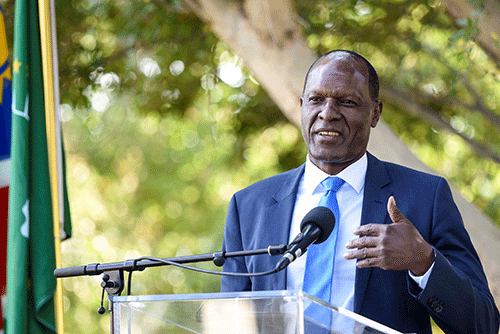Edward Mumbuu
Eveline de Klerk
Mines and energy minister Tom Alweendo has said he would feel betrayed if his erstwhile technical advisor Ralph Muyamba or any other official used information entrusted to him in confidence for self-enrichment. Alweendo, in a tell-it-all interview on Namibian Broadcasting Corporation (NBC) talk show ‘One on One’ last week, maintained his long-held anti-corruption stance, saying he was unaware of any dubious activities under his watch at the ministry. “Yes, I’d feel betrayed,” Alweendo said, noting the bribery allegations surrounding his former henchman are being dealt with by the Anti-Corruption Commission. Alweendo and Muyamba, who hurriedly resigned 24 hours after the allegations surfaced, and former mining commissioner Erasmus Shivolo, are have been fingered in a N$50 million bribery scandal that allegedly blocked the renewal of the exclusive prospecting licence (EPL) of Karlowa Mining Enterprises.
Alweendo also removed Shivolo from his position as mining commissioner amid the bribery claims.
He said this was purely an administrative decision, which was merely taken while the allegations unfolded.
According to him, he strongly believes in the doctrine that individuals should not occupy key positions, especially if they preside over major resources, for too long.
Shivolo had been in the position since 2008.
Asked why he did not remove him immediately when he assumed duty as mines and energy minister, Alweendo said he needed time to settle in and could not instantly make changes at the ministry.
Since then, Alweendo has been extinguishing fires over the purported bribery that seemingly refuses to die.
“When the allegations were made, we reported the issue to the ACC to do the investigations, and we also started to conduct our own investigation to see what really happened. But unfortunately, the internal investigation could prove anything or start. The person [Muyamba] had resigned from the ministry,”
On the day, he profusely denied accepting bribes from Chinese company Xinfeng Investment, which mines lithium near Uis in the Erongo region.
In the public domain, the technocrat-turned-politician has largely been seen as a squeaky clean staunch anti-graft activist.
He is also highly rated among his cabinet colleagues.
Alweendo, alongside lands reform minister Calle Schlettwein, were among the few senior government figures who came out strongly to condemn the Fishrot corruption when it unfolded in 2019.
He maintains nothing has changed.
“I am still the same person [who detests corruption],” he said.
He went on to say if it is found he has in any way unduly benefitted from illicit proceeds, he is prepared to face the full wrath of the law.
His two former colleagues – Sacky Shanghala (ex-justice minister) and Bernard Esau (ex-fisheries minister) – and four other Swapo-affiliated businessmen are currently in jail awaiting trial in the sprawling Fishrot corruption case, where the country’s resources were stolen at industrial proportions.
Lithium
Delivering a statement in the National Assembly on Tuesday, Alweendo said Namibians have the right to demand better stewardship over the country’s minerals.
For him, it is only right that the public demands that mineral resources are managed in their best interest.
He said this while responding to the controversial Lithium mine saga that is currently under investigation by the
ACC.
Alweendo said public concerns are genuine; hence, he took it upon himself to visit the Xinfeng mine in Omaruru as well as Namport to verify the quantity that will be exported.
The company is accused of buying a mining license from a man who had acquired it illegally while the true owner was hospitalised with a brain injury.
According to him, 135 000 tonnes of lithium exported by Xinfeng to China is an unreasonably high quota for testing purposes.
Alweendo also believes the company decided to export crushed ore – not only for testing purposes but also to make an income for its operations.
“It is, therefore, justifiable that the public expects us to be better stewards of our minerals. It is only right that the public demands we manage our mineral resources in the best interest of the current and future generations,” he said.
He then explained that earlier suggestions were that they are exporting more quantity than what they were permitted to export and were ordered to stop the process.
It turned out the company was still within the quantity for which they had valid export permits as issued by the mining commissioner. However, Alweendo said the mining license from which the crushed ore in question is being exported is not the same as the one surrounded by bribery
allegations.
“Regrettably, officials responsible for the administration of export permits neglected to agree with the company as to the total quantity of ore that was needed to be exported for testing purposes. As a result, the company applied for export permits as and when they needed to export, and the permits were issued,” Alweendo explained.
The company to date has been issued with export permits, totalling 135 000 tonnes of crushed ore.
Of the total ore, 75 000 tonnes have already been exported and the remainder is still to be exported.
Apart from that, Alweendo said the ministry would address the current challenges and strengthen the evaluation of exploration applications, consistent with the mining legislation.
“Each applicant will be required to provide us with a detailed exploration programme. The exploration programme must also be accompanied by a commensurate exploration budget and the details of appropriately skilled personnel that will be carrying out the actual exploration activities,” Alweendo said.



